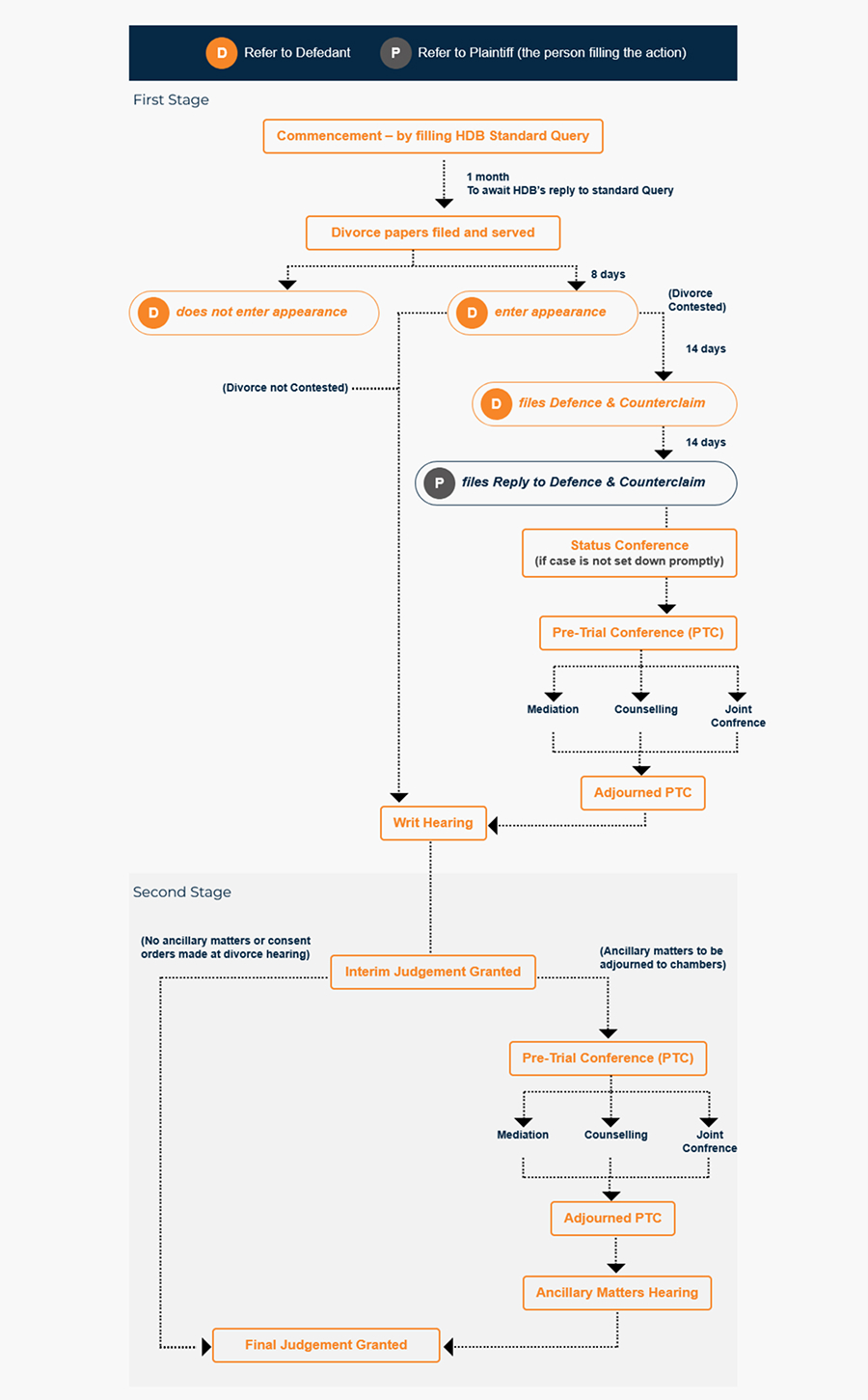The Divorce Process
Home Areas of Practice
Family Law
The Divorce Process
Getting Divorced in Singapore
The process for obtaining a divorce in Singapore is usually relatively straightforward, particularly when spouses agree on the grounds for divorce, child issues, division of marital assets, and maintenance (where applicable). This is what we call, an uncontested divorce.
Any difficulties that can make the divorce process lengthy and complicated, normally stem from a failure to agree on some or all of the above issues; thus making it a contested divorce, requiring parties to engage their own set of divorce lawyers.
In order to commence divorce proceedings, you will need to demonstrate to the court that your marriage has “irretrievably broken down”.
This can be for several reasons:
- Adultery – The court will consider your marriage to have irretrievably broken down, where you or your spouse have committed adultery and the other party finds it intolerable to live with the offending party.
- Unreasonable Behaviour – Where one partner has behaved in such a manner that the other party cannot reasonably be expected to live with them.
- Desertion – Where one party has deserted the Plaintiff for 2 years with no intention of returning
- Living Apart – Where you and your spouse have been living apart for 3 years, and the Defendant to the divorce action consents to divorce. If you have been living apart for 4 years or more, you do not require the consent of the other party to divorce.
- Mutual Agreement – You and your spouse both agree that the marriage has irretrievably broken down, have made attempts at reconciliation and have considered the ancillary matters, including the children’s issues and the financial issues.
Divorce in Singapore – Court Process
In Singapore, Divorce is a 2-step procedure.
In the first stage, Courts will deal with the termination of the marriage itself. Here, the Court will decide whether the marriage should be dissolved. At the end of this stage, if successful, parties will receive an Interim Judgment.
In the second stage of the proceedings, the Court will deal with ancillary matters. This includes the division of matrimonial assets (including matrimonial home), custody of any children, and any spousal or child maintenance. At the end of this stage, parties will receive a Final Judgment.
Stage 1 of Divorce Proceedings in Singapore - Termination of Marriage
A
The party filing the Writ of Divorce is called the Plaintiff. The party the divorce action is brought against is called the Defendant. If the Defendant has committed adultery, the third party is known as the “Co-Defendant”.
B
Before the commencement of the divorce proceedings, the Plaintiff’s solicitors will send out a Standard Query Form to the HDB and CPF Board to establish what is owed on your dwelling and your CPF balance. HDB have rules governing the use of HDB flats and they want to make sure rules are complied with under this new arrangement.
This process will take about one (1) month
C
To commence divorce proceedings, the following documents must be filed in Court:
- Writ for Divorce
- The Statement of Claim – This statement must specify which facts you are relying upon when asking the Court to grant you a divorce.
- The Statement of Particulars – This statement sets out in full the particulars of the facts pleaded in the Statement of Claim;
- Proposed Parenting Plan – (wherethere are children below 21). An Agreed Parenting Plan is only filed if both parties have managed to agree on the care arrangements for the children after the divorce (consent divorce);
- Proposed Matrimonial Property Plan – (where there is a Housing and Development Board (HDB) flat to be divided between parties).
- Agreed Matrimonial Property Plan – This is only filed if parties have managed to agree on what to do with the HDB flat after the divorce;
- Acknowledgement of Service
- Memorandum of Appearance
D
Once the Writ for Divorce has been filed in the Family Court, the same writ will be served on the Defendant via way personal service, if the address of the Defendant is known to the Plaintiff.
Steps (c) and (d) will take two (2) to four (4) weeks
E
If service of the papers on the Defendant fails after two attempts, the Plaintiff can make an application in the Family Court for Substituted Service. This allows the Plaintiff to obtain a Court Order to post the divorce papers to the last known address of the Defendant, and also to post on the Notice Board of the Family Court. Alternatively, the papers can be sent by Registered Post to the last known address of the Defendant or alternatively by email.
Step (e) will require one (1) month or thereabouts
F
If the Defendant’s address is unknown to the Plaintiff but the Plaintiff believes that the Defendant is still residing in Singapore, an application to the Family Court for Substituted Service by posting the Notice of Proceedings at the last known address, on the Notice Board of the Family Court or advertising the same in the local newspaper.
G
The Defendant will have to enter appearance to state within 8 days of the date of service of the Divorce Papers if they intend to contest the writ or ancillary matters. If no appearance is entered by the Defendant, either by himself or via his solicitors, in this time frame, the Plaintiff can proceed to file an Affidavit of Service and to set down the matter for trial.
H
Where appearance is entered by the Defendant
If the Defendant is not contesting the Divorce Writ, the Plaintiff can then proceed to set down the Writ for trial on an uncontested basis. A hearing date will be received within a month’s time, and the earliest trial date can be 10 days after setting down.
If the Defendant is contesting the Writ, they will have 22 days from the date of service of the Writ, or 14 days from the date of entry of appearance either –
(i) to file a Defence in the Family Court and serve the defence papers on the Plaintiff. If no Defence is filed in Court by the Defendant within the stipulated time limit, the Plaintiff can proceed to set down the Writ for trial as an uncontested action.
OR
(ii) If the Defendant files a Defence & Counter claim, the Plaintiff will have 14 days from the date of service of Defence to file their Reply to Defence & to Counter claim.
I
If the Divorce is uncontested, a hearing date will be given by the Court, but the requirement of parties to attend the court hearing is usually dispensed with, unless the Court requires the compulsory attendance of parties. The hearing will usually last 5-10 minutes. The Judge, if satisfied with the case, will grant an Interim Judgment, to be made Final after 3 months.
If the Divorce is contested, PTCs (Pre-Trial Conferences) will be conducted. The main objective of a PTC is to look into whether there are common areas where parties can agree, thus narrowing the issues to be heard by the Court. Sometimes a date for Mediation is also fixed to resolve certain issues.
If the PTC or Mediation is not successful, a hearing date will be given depending on the Family Court’s calendar. The duration of trial is usually one day. In contested cases, both the Plaintiff and the Defendant and the respective witnesses give evidence in Court by way of affidavit evidence and are cross-examined on their affidavits. In most cases, after a PTC (and sometimes after several conferences) the Divorce Writ proceeds as uncontested leaving the ancillary matters to be contested.
Stage 2 of Divorce Proceedings in Singapore - Ancillary Matters
A
Hearing of Ancillary Matters.
Questions of spousal maintenance, custody or children, division of assets and costs, etc. may be adjourned to be heard in Chambers at a date to be fixed by the Registrar. The Registrar may also fix a Mediation session to assist parties in resolving the issues amicably.
The Court will require parties to file their respective Affidavit of Assets and Means in which they must disclose all assets, liabilities, income and expenditure. There are two (2) rounds of exchange of Affidavits. Parties are entitled to also undertake Discovery, Injunctions and Interrogatories proceedings at this stage if they suspect assets, liabilities, income and expenditure have not been truthfully disclosed.
Once parties have filed the prerequisite affidavits, they will also be required to file a Check List and an Ancillary Matters Facts and Position Sheet. Upon filing these documents, the Court will then decide if the matter should be heard in the Family Court or transferred to the High Court. The case can be transferred if the Court agrees that the case has an important question of law, is a test case, or for any other sufficient reason. Usually, the case will be heard in the High Court if the net value of the asset exceeds $ 5 million.
Thereafter, an Ancillary Hearing date will be fixed to hear the respective counsels’ written and oral submissions in Court.
B
3 months from the date of making Interim Judgment, provided that the ancillary matters have been heard and the requisite orders made, the Plaintiff can proceed to file the necessary papers to extract the Final Judgment Order.




